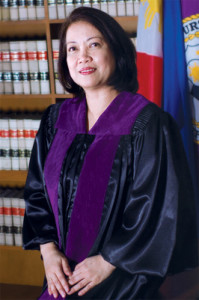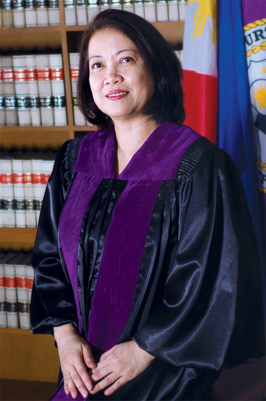By DARLENE CAY
THE system of legal education needs to be changed from its obsession with topping the bar exams to one where critical thought is encouraged and enhanced, Supreme Court Chief Justice Maria Lourdes Sereno said in her speech at the 97th commencement exercises of the University of the Philippines College of Law.
“Almost all law schools in the country gear their curriculum towards preparing their graduates to pass and top the bar examinations. But sadly, it is only a very small minority who devote time and effort to offer multi-disciplinary courses to produce not only skilled practitioners, [but also] passionate advocates,” said Sereno, who was her alma mater’s commencement speaker.
Sereno graduated valedictorian from the UP College of Law in 1984. She got a rating of 89 in the bar exams but failed to make it to the top 10. The College, known for producing presidents and politicians, has been criticized for failing to consistently top the bar exams.
The last time a UP student topped the bar exams was in 2005. In the 2012 exams, four UP graduates obtained places in the top 10. The year before that, however, no one from UP made the cut.

Despite this, Sereno said the college must continue to take the lead in training and producing lawyers who not only pass the bar exams, but are “not afraid to articulate positions that may disturb and unsettle.”
UP Law continues to hit a high passing rate. In the 2012 bar exams, it was able to obtain a 73.38% mark.
Sereno said the Supreme Court (SC) has already started discussions on revisions in the law curriculum as precondition for the bar exams. It will start with a comprehensive review of the current legal education system, particularly the content and method of teaching.
SC is mandated to regulate admission to the Bar and to administer the exams.
The bar exams last year was harder because of its combined multiple choice and essay format. It was also in 2012 when the lowest passing rate in more than a decade was recorded. Only 17.76 percent or 949 out of 5,343 bar examinees passed even when the passing grade was lowered from 75 to 70 percent.
“Sadly, ours is a culture where the pressure to conform is very great,” she said, acknowledging the pressure to always make it to the highly-publicized top 10.
She said the reemphasis of law education will reduce the problem of having judges who grievously err and lawyers who take shortcuts.
“More than just allowing massive enrolled, law schools must inculcate not only the knowledge of what is legal, but also the conviction of what is good,” said Sereno.
Teaching law in the “grand manner,” as she said, calls for a reorientation to allow not only more multi-disciplinary courses, but also more interaction.
She said, “It is only through interaction that thinkers…may be better prepared for the future – where hard questions are asked and challenging narratives are offered.”
Sereno, however, acknowledged the fact that the system required to effect changes in the judicial reform will take time to root. But instead of being discouraged, law schools and practitioners must take this as a challenge.
The UP College of Law remains one of the country’s premier law schools and aspiring lawyers scramble for a slot in its roster. About 3,000 took the Law Aptitude Examination in 2008. Of this number, 200 were accepted. But only about 160 made it to this year’s graduation.
